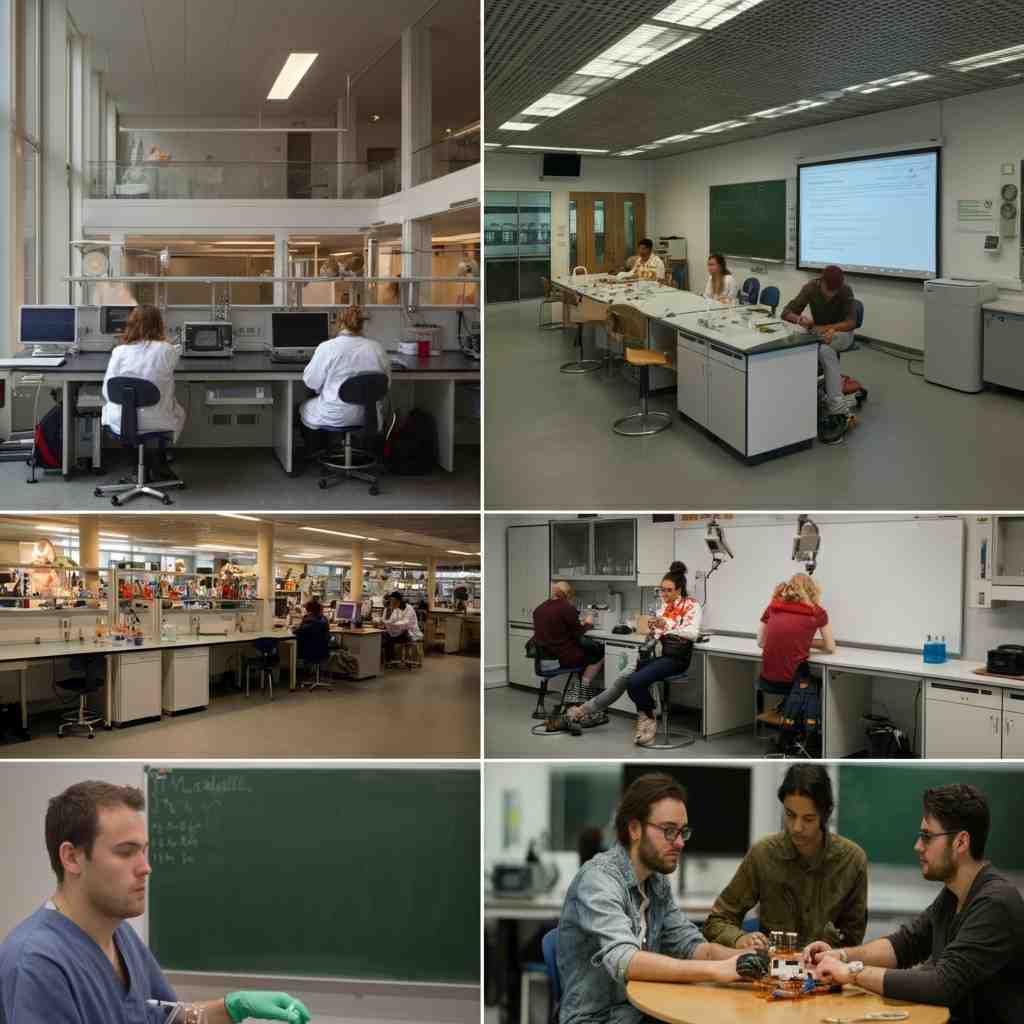You want to study to become a doctor across Europe. Medical universities in Germany are among the most sought-after for students worldwide, thanks to their global rankings, affordable fees, and strong focus on hands-on training. The medical universities in Germany provide a path for students to succeed as doctors in research, clinical work, or global healthcare. This guide will walk you through the best medical universities in Germany, what you’ll pay, and how to get started, especially if you’re an Indian student looking to make your mark.
Why Choose Medical Universities in Germany?
Medical universities in Germany attract thousands of international students every year because they combine world-class education with affordability and global recognition. Many countries accept German medical school degrees because of Germany’s high standards, as Germany leads medical innovation and healthcare delivery. Domestic and public universities here provide students excellent educational opportunities, plus free education, while supplying classrooms that use current technology. Indian students and others from abroad find a pleasant learning environment in Germany, where numerous courses are taught in English plus offer direct paths to medical licenses.
- Germany’s unique value proposition includes:
- Medical learners gain worldwide respected degrees through our system
- Affordable or tuition-free education at public universities
- You will gain access to medical research facilities and get real-world training experiences.
- A multicultural environment with support for international students
- Scholarships and financial aid opportunities for medical education in Germany for foreigners
- Students benefit from top-ranked medical universities in Germany because 10 of them currently appear in the world’s top 200 medicine rankings.
Best Medical Universities in Germany (2025 Rankings)
When it comes to the best medical universities in Germany, several names consistently appear at the top of global rankings. These universities lead worldwide because they conduct high-quality research while providing excellent clinical care and engaging international students. This list shows which universities will lead medical education in Germany for 2025.
Top 10 Medical Universities in Germany 2025
| University | QS 2025 | THE 2025 | Notable Programs |
| Heidelberg University | 31 | 47 | Medicine, Medical Education |
| LMU Munich | 38 | 38 | Medicine, Dentistry |
| Charité – Universitätsmedizin Berlin | 79 | 93 | Medicine, Neurosciences |
| Technical University of Munich (TUM) | 72 | 26 | Medicine, Molecular Science |
| University of Tübingen | 128 | 100 | Medicine, Neurosciences |
| University of Hamburg | 126 | 132 | Medicine, Dentistry |
| University of Freiburg | 135 | 128 | Medicine, Nursing Science |
| RWTH Aachen University | 193 | 92 | Health Informatics |
| University of Göttingen | 161 | 121 | Medicine, Medical Informatics |
| Medizinische Hochschule Hannover | 158 | – | Medicine, Transplantation |
These universities excel when it comes to research, international relationships, and diverse medical training programs. Heidelberg University represents the oldest medical school in Germany and leads medical education in research-based teaching methods. The universities LMU Munich and Charité University Medical Centre Berlin lead in clinical teaching, and they help international students succeed. Students from around the world will find these institutions appealing because they provide MBBS programs taught in English.
Medical Universities in Germany Fees: What to Expect in 2025?
You need to know how much it costs to study medicine in Germany to make proper academic planning. The good news: most public medical universities in Germany charge no tuition fees, only a modest semester contribution. Private universities have larger yearly costs than public universities.
Public vs. Private Medical University Fees
Public Universities:
- German public medical universities do not charge students tuition regardless of their national background
- Students need to pay between €100 to €400 per semester or between ₹9000 to ₹36000 as semester contributions
- LMU Munich asks students for a semester fee of €856 instead of tuition.
Private Universities:
- Students will need to pay between 9 Lakhs and 27 Lakhs rupees for each year of coursework, depending on the medical university they choose.
- Additional costs for registration and administration
Living Expenses:
- You need €700 to €1,200 (about ₹63,000 and ₹1,08,000) monthly to pay for your room, meals, insurance, and daily spending.
- Personal healthcare, along with books and daily spending, requires extra money.
Here’s a quick comparison:
| University type | Tuition Types | Semester Contribution | Living Expenses |
| Public | €0 | €100–€400 | €700–€1,200 |
| Private | €10,000–€30,000/year | Varies | €700–€1,200 |
For many, low fees and high-quality education make public universities the cheapest medical universities in Germany.
Medical Universities in Germany for Indian Students: Everything You Need to Know in 2025
Most Indian students seeking MBBS study programs abroad choose to go to Germany. Medical universities in Germany for Indian students offer a blend of affordability, quality, and global recognition. Getting admitted to German medical schools requires strong preparation because acceptance is challenging.
Latest Admission Process and Eligibility
International students, especially from India, seeking MBBS in Germany, need to fulfil multiple criteria to apply.
- Students need to graduate from 12th grade with courses in Physics, Chemistry, and Biology from an accepted college or school.
- Minimum 50% marks in PCB subjects
- All Indian students planning to take the MBBS must pass the NEET exam.
- German language proficiency (TestDaF, DSH, or Goethe C2) for most programs, though some offer partial English instruction
- Some universities demand that students take the TestAS test to measure aptitude.
- You need to study at the Studienkolleg before joining a medical university without meeting the German Abitur standards.
- International students need IELTS or TOEFL test scores when applying to English language study programs in German universities.
- You must show the blocked account company that you have enough money to cover expenses totalling €11,208 every year.
- APS Certificate and a valid passport
You must submit your medical university application to either uni-assist or directly to the school with essential documents such as official records, your NEET results, and language verification.
Scholarships and Financial Aid
The German government provides training funds for medical studies to foreign students, including citizens of India. The German Academic Exchange Service and Heinrich Boll Foundation operate as leading providers of German funding options. Meritorious students can receive funding for both education costs and living costs.
Tips for increasing your chances:
- Submit your application soon with all the required documents ready.
- Show admissions officers your school results and non-school activities in your application materials.
- Students should ask student support staff and former schoolmates for help.
Student Life and Support Services
Indian students in Germany benefit from a strong network of student associations, mentorship programs, and cultural events. Universities help their students find affordable living spaces plus offer help for both travel arrangements and part-time work. Indian students find it simpler to adapt to German life because numerous cities offer Indian cuisine and grocery outlets. Student unions and international office departments run activities to support new students as they start living in Germany.
How to Apply to Medical Universities in Germany 2025?
Applying to medical universities in Germany can seem complex, but breaking it down into steps makes it manageable. Here’s what you need to do:
- Examine which universities in Germany have MBBS or medicine programs open to international students.
- Verify if you fulfil all academic and language standards and satisfy the entrance examination results.
- Collect all required documents, including your school records, NEET test results, language test scores, personal statement, letters of recommendation, passport and Admission Procedure Service certificate.
- Register for German language exams, including TestDaF, DSH, Goethe and take the Test as if necessary.
- To pursue Studienkolleg, you need to apply if your 12th-grade certification is not on equal standing with the German Abitur.
- Give your documents through uni-assist or apply straight to the university.
- Almost immediately after receiving acceptance, you will get your formal letter.
- Take your acceptance letter with funding evidence, insurance papers, and the necessary paperwork to the German embassy to get the student visa.
- Organise where you will live and how you will travel, plus attend university orientation events before your decision.
- Begin preparing for your German medical program one year ahead because document verification takes time, and deadlines apply last minute.
Also Read: Living Expenses In Germany For Indian Students: Latest Guide
English-Taught Medical Programs in Germany 2025
Since many German universities taught medical courses in German only, they now add MBBS Germany programs that use English as the teaching language. These classes draw many students who study abroad and do not speak German fluently.
These universities provide medical programs through the English language:
- Heidelberg University
- LMU Munich
- Charité – Universitätsmedizin Berlin
- Technical University of Munich
The requirements for this medical program direct potential students to show higher scores in English language tests and also require limited German skills. Students can begin medical education in English before developing German language ability for later courses.
Pros:
- International students find the start of their medical studies more comfortable
- No need for advanced German at the outset
Cons:
- Limited number of seats
- Not all clinical or practical courses require students to demonstrate their German language skills.
Career Prospects After Studying Medicine in Germany
Graduates from medical universities in Germany are well-positioned for successful careers both within Germany and internationally. To practice medicine in Germany, you must first earn your medical degree while also passing the German medical licensing test named Approbation. Students must show their language and medical training expertise during the application period.
Career pathways:
- After getting your approval, you can work in German medical institutions.
- The German MBBS program is valid for Indian students, but pursuing practice there requires passing the Foreign Medical Graduate Examination.
- German medical doctors can work anywhere globally since their degrees earn respect in European countries, the Middle East, and international markets.
- Germany accepts doctors who earned their medical training abroad because reports indicate that 13% of medical professionals in the country belong to this category.
Conclusion
Medical universities in Germany are a top choice for students seeking high-quality, affordable, and globally recognised medical education. The best medical universities in Germany, like Heidelberg University, LMU Munich, and Charité – Universitätsmedizin Berlin, offer world-class programs, cutting-edge research, and strong support for international students. Germany is a great medical education option because its public universities grant free tuition while providing various scholarship opportunities. If you want to work toward your medical future, then this moment allows you to evaluate study options and embark on your professional path.
FAQs (Frequently Asked Questions)
Q1. For medical studies in Germany, students must attend classes for a combined 12 years and 3 months.
Students need 82 months to complete medical studies in Germany, which includes one actual clinical training year.
Q2. German medical universities require the successful completion of the National Eligibility Entrance Test.
Students from India who want to enrol in German MBBS programs need to pass the National Eligibility and Entrance Test NEET.
Q3. Does Germany have MBBS medical schools that use English as the teaching language?
Several German universities provide MBBS courses taught in English, mainly for students in their pre-clinical studies.
Q4. What expenses must medical students expect during their studies in Germany?
The average monthly expenses for basic needs such as housing, food, insurance and daily essentials come to between €700 and €1200 per month.
Q5. Indian students who graduate from German medical schools can practice medicine in the country.
An Indian medical student may practice in Germany following their approval in Germany’s medical licensing test, plus language requirements.








